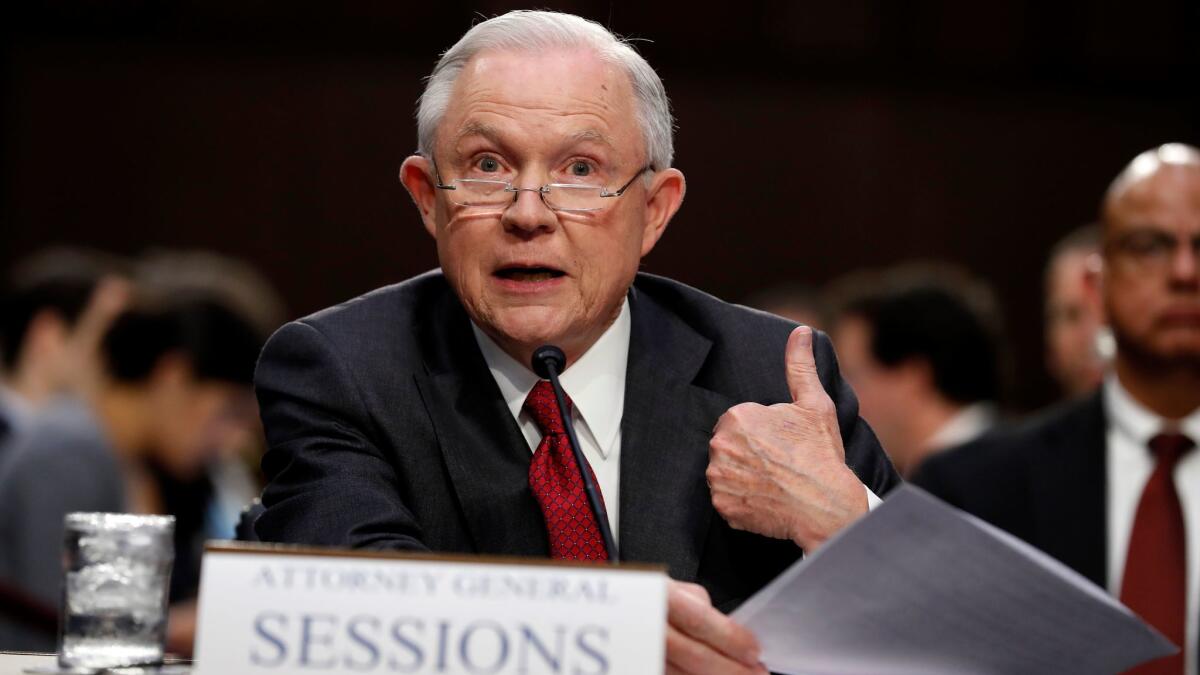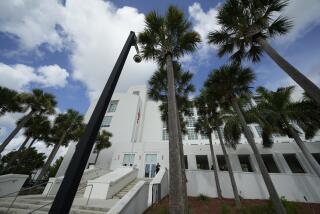After new revelations, Sessions faces another grilling on Russia contacts in Trump campaign

Reporting from Washington — For Atty. Gen. Jeff Sessions, questions about the Trump campaign and Russia have become a nagging headache that won’t go away.
Three times, he has appeared before his former colleagues in the Senate and answered questions about what he knew about contacts with Russians during the campaign. Three times, Sessions stumbled, issuing denials that later proved to be incomplete or wrong.
For the record:
7:05 a.m. Nov. 12, 2017An earlier version of this article gave the wrong location for a meeting in March 2016 attended by then-Sen. Jeff Sessions and George Papadopoulos. It was held in Washington, not New York.
On Tuesday, the nation’s highest lawman will face another grilling on Capitol Hill, this time prompted by claims in court documents and congressional testimony that he was told of at least two aides’ meetings with Russian officials — despite his claim last month that he was unaware of any such contacts.
“The facts appear to contradict your sworn testimony on several occasions,” all 17 Democrats on the House Judiciary Committee wrote to Sessions last week in advance of his appearance there.
Sessions will appear a day after the Justice Department informed the committee that he is considering appointing a second special prosecutor — this time to investigate allegations involving Hillary Clinton, a move that President Trump has long demanded.
The letter to Rep. Robert W. Goodlatte (R-Va.), chairman of the committee, said senior prosecutors were looking into whether a special counsel should be named to investigate the Clinton Foundation, Clinton’s use of a private email server while secretary of State, former FBI Director James B. Comey’s decision not to prosecute Clinton, and a 2010 decision by the Obama administration regarding sales of uranium to a Russian company.
The prospect that the Justice Department will investigate the losing candidate in a presidential race drew sharp criticism late Monday and is sure to come up when Sessions testifies.
No evidence has yet emerged to show that anyone in the Trump campaign was directly involved with Russia’s attempts to influence the election through computer hacking and social media — much less that Sessions knew about it.
But Sessions’ serial inconsistencies have given Democrats an opening to hammer his credibility. They also helped fuel congressional investigations into the Russian meddling and the possible involvement of the Trump campaign, the focus of the criminal investigation led by special counsel Robert S. Mueller III.
It’s a potential crime to lie to Congress, though prosecutions for perjury are extremely rare. But the controversy already has damaged trust in Sessions, who also endured an extraordinary public flogging by Trump over the summer for recusing himself from the Russia probe.
The shifting accounts “will dog him throughout his tenure as attorney general,” said Laurie Levenson, a former federal prosecutor who now is a professor at Loyola Law School in Los Angeles. Sessions has been “neutered” by questions about his probity, she said.
“If the person on the highest level sworn to uphold the law is the one you cannot trust, that’s a big problem for the entire Justice Department,” she said.
A former U.S. prosecutor and four-term U.S. senator from Alabama, Sessions endorsed Trump in early 2016, boosting the novice candidate when most GOP leaders were shunning him. Sessions became head of the campaign’s foreign policy team, and he soon echoed Trump’s friendlier policies toward Russian President Vladimir Putin.
That March, Trump named several foreign policy advisors to work under Sessions, including energy consultants Carter Page and George Papadopoulos. Neither was known in foreign policy circles, and both soon met with Russian intermediaries — and say they told Sessions about it.
According to court papers, Papadopoulos, who lived in London, met a professor there who said the Russians had “dirt” on Hillary Clinton, including “thousands of emails.” This was several months before the first hacked emails were released to the public. He also met a woman who he believed was Putin’s niece.
In follow-up emails, Papadopoulos was urged to arrange a meeting between Trump or his top aides and senior Kremlin officials.
On March 31, 2016, Papadopoulus sat at a long conference table in Washington with Trump on one end and Sessions at the other. At one point, the 30-year-old aide bragged about his Russian connections and his efforts to set up a meeting with Putin.
“He was shut down pretty quickly by Senator Sessions, and no such meeting [with the Kremlin] ever happened,” said J.D. Gordon, a former Pentagon spokesman who was also at the meeting. Gordon said Sessions said he would “prefer that nobody speak about this again.”
Papadopoulos has pleaded guilty to lying to the FBI about his Russian contacts. He secretly cooperated with the FBI for three months after his arrest in July, court documents show.
Page also says he informed Sessions about his contacts in Russia.
Page told the House Intelligence Committee that in July 2016 he confided in Sessions, after a dinner at the Capitol Hill Club, about his plans to deliver a speech in Moscow. While there, Page also told the committee, he had a “private discussion” with one of Russia’s deputy prime ministers and met several Russian lawmakers.
Page told the panel that he “just mentioned it [to Sessions] in passing,” according to a transcript. “He had no reaction whatsoever.”
In an email, Page said he wasn’t surprised that Sessions didn’t recall the encounter and said the trip was “totally unrelated” to the campaign.
“Bear in mind that he was one of the most important and senior people of Congress last year,” he wrote. “If he HAD remembered our brief interaction, which peripherally alluded to a complete irrelevancy, I would have been completely shocked.”
Sessions tried to distance himself from the Russia investigation soon after he was confirmed as attorney general. On March 2, he recused himself from supervising the investigation because he said his work on the campaign posed a potential conflict.
But his answers about his contacts have only entangled him more deeply.
During his Senate confirmation hearing in January, he told Sen. Al Franken, (D-Minn.) that he “did not have communications” with Russians during the campaign. He said the same thing in follow-up responses to Sen. Patrick J. Leahy (D-Vt.).
Media reports later revealed that Sessions spoke at least three times with then-Russian Ambassador Sergey Kislyak during the campaign.
On June 13, appearing before the Senate Intelligence Committee, Sessions repeatedly denied knowing of any other meetings between Russian officials and anyone connected with the campaign, including Page.
“I don’t recall any,” he said.
On Oct. 18, Sessions returned to the Senate Judiciary Committee and denied lying about his meetings with Kislyak, explaining that he was trying to deny something else.
“It was referring directly to the suggestion that there was a continuing exchange of information between Trump’s surrogates and intermediaries for the Russian government, which did not happen, at least to my knowledge, and not with me,” he said.
Pressed again by Franken, Sessions said: “I did not, and I’m not aware of anyone else that did.” He added, “I don’t believe it happened.”
After Papadopoulos’ guilty plea was disclosed on Oct. 30, Franken said he could not believe Sessions did not recall his “strong reaction” to his aide’s proposal to meet with Putin.
Sessions again “apparently failed to tell the truth, under oath, about the Trump team’s contacts with agents of Russia,” Franken wrote in a letter to the attorney general. He said the episode suggests “the Senate — and the American public — cannot trust your word.”
A Justice Department spokeswoman declined comment, saying Sessions would address the issue at the hearing.
Twitter: @jtanfani
UPDATES:
Nov. 13, 8 p.m.: This article was updated to include information about Atty. Gen. Jeff Sessions’ considering appointing a special prosecutor to investigate Hillary Clinton.
This article was originally published at 3 a.m. on Nov. 12.
More to Read
Get the L.A. Times Politics newsletter
Deeply reported insights into legislation, politics and policy from Sacramento, Washington and beyond. In your inbox three times per week.
You may occasionally receive promotional content from the Los Angeles Times.











